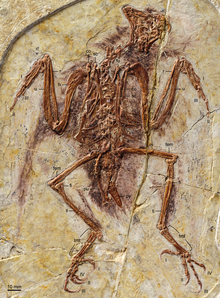
Back طيور نقيضة Arabic Enantiornites Catalan Enantiornithes Czech Enantiornithes German Enantiornithes Esperanto Enantiornithes Spanish ناهمسانمرغان Persian Enantiornithes Finnish Enantiornithes French Enantiornithes Galician
| Enantiornithes | |
|---|---|

| |
| Fossil specimen of a bohaiornithid (Zhouornis hani) | |
| Scientific classification | |
| Domain: | Eukaryota |
| Kingdom: | Animalia |
| Phylum: | Chordata |
| Clade: | Dinosauria |
| Clade: | Saurischia |
| Clade: | Theropoda |
| Clade: | Avialae |
| Clade: | Ornithothoraces |
| Clade: | †Enantiornithes Walker, 1981 |
| Subgroups | |
|
and see text | |
The Enantiornithes, also known as enantiornithines or enantiornitheans in literature, are a group of extinct avialans ("birds" in the broad sense), the most abundant and diverse group known from the Mesozoic era.[3][4][5] Almost all retained teeth and clawed fingers on each wing, but otherwise looked much like modern birds externally. Over seventy species of Enantiornithes have been named, but some names represent only single bones, so it is likely that not all are valid. The Enantiornithes became extinct at the Cretaceous–Paleogene boundary, along with Hesperornithes and all other non-avian dinosaurs.
- ^ a b Wang, X.; O'Connor, J. K.; Zheng, X.; Wang, M.; Hu, H.; Zhou, Z. (2014). "Insights into the evolution of rachis dominated tail feathers from a new basal enantiornithine (Aves: Ornithothoraces)". Biological Journal of the Linnean Society. 113 (3): 805–819. doi:10.1111/bij.12313.
- ^ Cite error: The named reference
bohaiornithidaewas invoked but never defined (see the help page). - ^ Chiappe, Luis M.; Walker, Cyril A. (2002). "Skeletal Morphology and Systematics of the Cretaceous Euenantiornithes (Ornithothoraces: Enantiornithes)". In Chiappe, Luis M.; Witmer, Lawrence M. (eds.). Mesozoic Birds: Above the Heads of Dinosaurs. University of California Press. pp. 240–67. ISBN 978-0-520-20094-4.
- ^ Chiappe, Luis M. (2007). Glorified Dinosaurs: The Origin and Early Evolution of Birds. Hoboken, New Jersey: John Wiley and Sons. ISBN 978-0-471-24723-4.[page needed]
- ^ O'Connor, Jingmai K.; Chiappe, Luis M.; Gao, Chunling; Zhao, Bo (September 2011). "Anatomy of the Early Cretaceous Enantiornithine Bird Rapaxavis pani". Acta Palaeontologica Polonica. 56 (3): 463–475. doi:10.4202/app.2010.0047. S2CID 55311115.